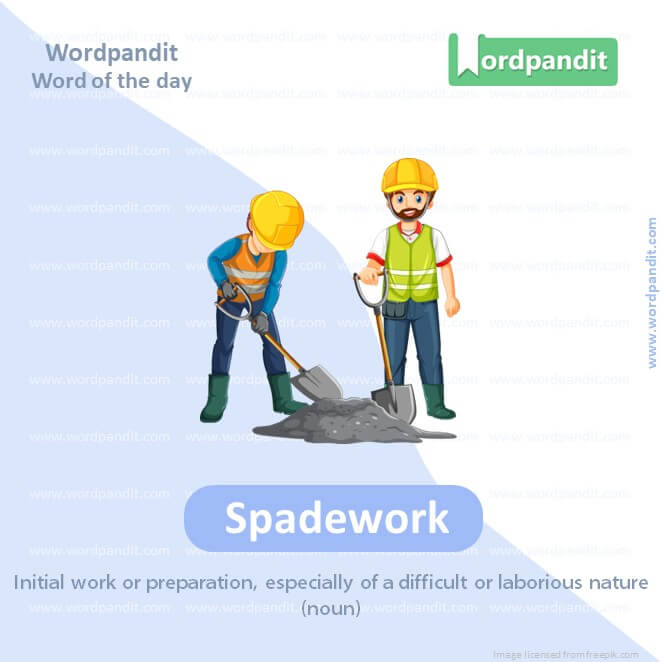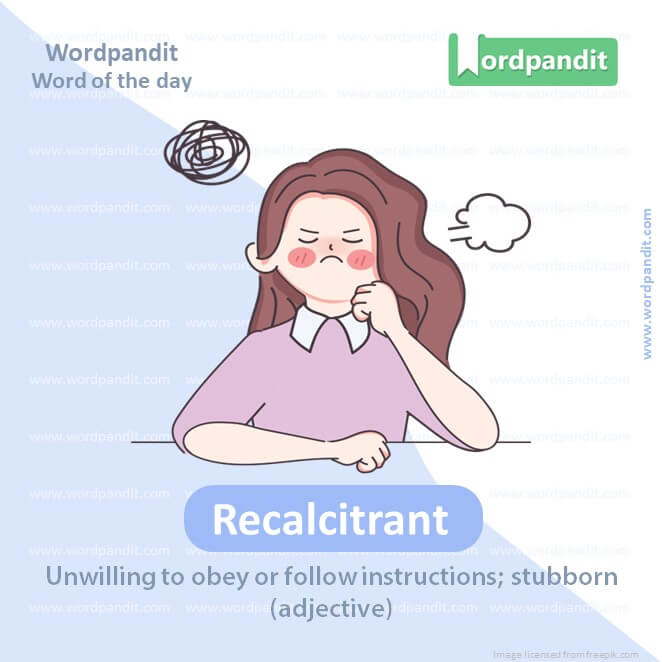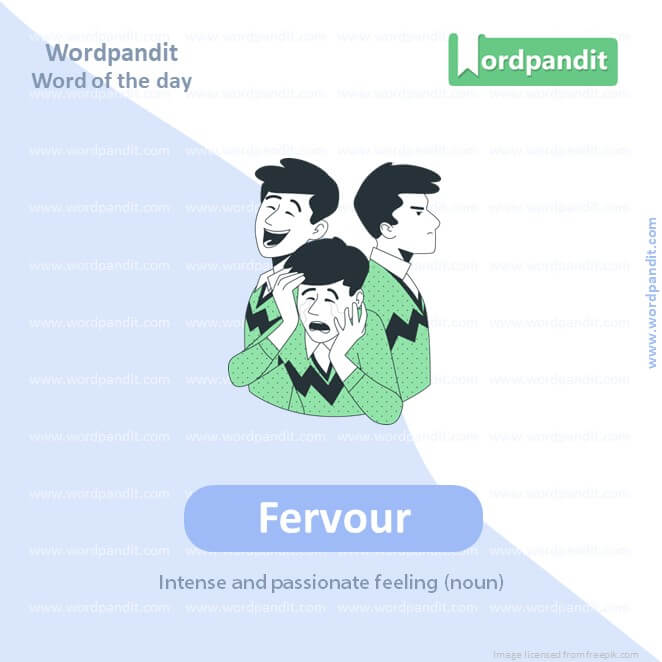Daily Vocabulary Words: List of Daily Used Words
Hi there. Welcome to this special section @ Wordpandit.
Our endeavour here is straightforward: highlighting important daily vocabulary words, you would encounter in The Hindu. This is your repository of commonly used words; essentially, we are posting a list of daily used words. Hence, this has significant practical application as it teaches you words that are commonly used in a leading publication such as The Hindu.
Visit the website daily to learn words from The Hindu.

WORD-1: Spadework
CONTEXT: The spadework of nearly five years, carried out in cataclysmic conditions, preceded that general election.
SOURCE: The Hindu
EXPLANATORY PARAGRAPH: Imagine if you’re preparing a garden by digging and planting seeds. That initial hard work of digging is spadework—it’s the foundational work that needs to be done before anything else.
MEANING: Initial work or preparation, especially of a difficult or laborious nature (noun).
PRONUNCIATION: SPAYD-wurk
SYNONYMS: groundwork, preparation, preliminary work, groundwork, foundation
USAGE EXAMPLE:
1. The research team spent months doing the spadework before conducting experiments.
2. Success in business often requires a lot of spadework in the early stages.
3. She credited her success to the spadework she put in during her training.
4. The spadework of negotiations laid the foundation for future agreements.

WORD-2: Onerous
CONTEXT: Onerous enough were the tasks of nation-building and reversing the depredations of colonial rule, but the makers of modern India had a lot more to reckon with: the flames of Partition had to be doused and refugees rehabilitated, the ferocious invasion of Kashmir had to be quelled, and over 500 princely states with recalcitrant rulers had to be drawn into the Union.
SOURCE: The Hindu
EXPLANATORY PARAGRAPH: Imagine if you had to carry a very heavy backpack with lots of books. That’s onerous—it’s when something is burdensome, difficult, and requires a lot of effort.
MEANING: Involving a great deal of effort, trouble, or difficulty (Adjective).
PRONUNCIATION: ON-er-uhs
SYNONYMS: burdensome, arduous, taxing, challenging, difficult
USAGE EXAMPLE:
1. The new regulations placed an onerous burden on small businesses.
2. Her job responsibilities became increasingly onerous as the company grew.
3. The project’s timeline was extended due to its onerous nature.
4. The onerous task of cleaning up after the party fell to the hosts.
WORD-3: Ferocious
CONTEXT: Onerous enough were the tasks of nation-building and reversing the depredations of colonial rule, but the makers of modern India had a lot more to reckon with: the flames of Partition had to be doused and refugees rehabilitated, the ferocious invasion of Kashmir had to be quelled, and over 500 princely states with recalcitrant rulers had to be drawn into the Union.
SOURCE: The Hindu
EXPLANATORY PARAGRAPH: Imagine a wild animal like a lion or a tiger roaring loudly and showing its sharp teeth. That’s ferocious—it’s when something is very fierce, aggressive, and intense.
MEANING: Fierce, aggressive, and intense in behavior or appearance (adjective).
PRONUNCIATION: fuh-ROH-shuhs
SYNONYMS: fierce, savage, vicious, aggressive, wild
USAGE EXAMPLE:
1. The ferocious storm caused widespread damage to the coastal area.
2. His ferocious determination to win impressed everyone.
3. The battle was marked by ferocious fighting on both sides.
4. The ferocious expression on his face scared away intruders.

WORD-4: Recalcitrant
CONTEXT: the ferocious invasion of Kashmir had to be quelled, and over 500 princely states with recalcitrant rulers had to be drawn into the Union.
SOURCE: The Hindu
EXPLANATORY PARAGRAPH: Imagine a stubborn horse that refuses to move no matter how much you try to push it. That’s recalcitrant—it’s when someone or something is stubborn and resistant to authority or control.
MEANING: Unwilling to obey or follow instructions; stubborn
(adjective).
PRONUNCIATION: ri-KAL-si-truhnt
SYNONYMS: disobedient, unruly, defiant, obstinate, stubborn
USAGE EXAMPLE:
1. The recalcitrant student refused to follow the teacher’s instructions.
2. Despite warnings, the recalcitrant employee continued to break company policies.
3. Negotiations with the recalcitrant group proved to be challenging.
4. His recalcitrant attitude towards safety regulations endangered others.
WORD-5: Trailblazing
CONTEXT: While many other decolonised nations tumbled into authoritarianism, India drafted a trailblazing Constitution, affording a largely indigent and illiterate populace universal adult franchise: something even the United States, the world’s oldest modern democracy, had not yet done.
SOURCE: The Hindu
EXPLANATORY PARAGRAPH: Imagine if you were the first person to discover a new path through a forest. That’s trailblazing—it’s about being a pioneer and creating a new way for others to follow.
MEANING: Pioneering or leading the way; innovative or groundbreaking (adjective).
PRONUNCIATION: TREYL-bley-zing
SYNONYMS: pioneering, innovative, groundbreaking, pioneering, inventive
USAGE EXAMPLE:
1. She was known for her trailblazing research in medical science.
2. The company’s trailblazing approach to technology revolutionized the industry.
3. His trailblazing efforts in social activism inspired many others.
4. The trailblazing spirit of exploration led to new discoveries.
WORD-6: Unlettered
CONTEXT: the People Act, 1950, we began evolving a system of voting for our enormous, geographically diverse country with 176 million eligible voters, about 85% of them unlettered.
SOURCE: The Hindu
EXPLANATORY PARAGRAPH: Imagine if someone never learned how to read or write. That person is unlettered—it means they are not educated or literate.
MEANING: Lacking in education or literacy; not able to read or write (adjective).
PRONUNCIATION: uhn-LET-erd
SYNONYMS: illiterate, uneducated, ignorant, uninformed, unschooled
USAGE EXAMPLE:
1. Many people in the village were unlettered and relied on oral traditions.
2. The unlettered laborers worked hard but lacked formal education.
3. The document was written in simple language for the benefit of the unlettered.
4. Education programs aimed to uplift the unlettered population.
WORD-7: Searing
CONTEXT: a belief in the primacy of Hindus over India’s minorities, a searing mistrust of Muslims, and a fervour for Hindi’s nationwide imposition.
SOURCE: The Hindu
EXPLANATORY PARAGRAPH: Imagine touching something very hot and feeling a sharp, burning pain. That’s searing—it’s when something is extremely hot, intense, or painful.
MEANING: Extremely hot or intense; causing a burning or piercing sensation (adjective).
PRONUNCIATION: SEER-ing
SYNONYMS: burning, scorching, blistering, intense, piercing
USAGE EXAMPLE:
1. The searing heat of the desert made it difficult to travel.
2. Her words left a searing impact on his emotions.
3. The searing pain in his leg made him wince.
4. The searing criticism from the media caught the politician off guard.

WORD-8: Formidable
CONTEXT: Far from building a cult of personality around himself to consolidate his power, Nehru faced, even before the electoral contest of 1951–52, a formidable challenge to his values and leadership from within his own party.
SOURCE: The Hindu
EXPLANATORY PARAGRAPH: Imagine facing a giant, powerful dragon in a story. That’s formidable—it’s when something is impressive, powerful, and often intimidating.
MEANING: Inspiring fear or respect through being impressively powerful,
capable, or intense.
PRONUNCIATION: for-MID-uh-buhl
SYNONYMS: impressive, imposing, powerful, daunting, intimidating
USAGE EXAMPLE:
1. The army faced a formidable enemy in the battle.
2. Her formidable intellect made her a respected scholar.
3. The task ahead seemed formidable but not impossible.
4. The team overcame formidable challenges to win the championship.

WORD-9: Fervour
CONTEXT: a belief in the primacy of Hindus over India’s minorities, a searing mistrust of Muslims, and a fervour for Hindi’s nationwide imposition.
SOURCE: The Hindu
EXPLANATORY PARAGRAPH: Imagine cheering loudly and passionately for your favorite sports team during a game. That’s fervour—it’s when you have strong and enthusiastic feelings about something.
MEANING: Intense and passionate feeling (noun).
PRONUNCIATION: FUR-ver
SYNONYMS: passion, enthusiasm, zeal, ardor, fervency
USAGE EXAMPLE:
1. The crowd cheered with fervour as the team scored a winning goal.
2. Her fervour for environmental conservation inspired others to take action.
3. The artist’s paintings were created with great fervour and emotion.
4. The fervour of the protest rally was palpable in the air.
WORD-10: Redoubtable
CONTEXT: From J.B. Kripalani and Jayaprakash Narayan to Babasaheb Ambedkar and S.P. Mookerjee, redoubtable leaders of all stripes berated Nehru and the Congress every day.
SOURCE: The Hindu
EXPLANATORY PARAGRAPH: Imagine facing a legendary warrior known for their strength and bravery. That person is redoubtable—they are formidable and worthy of respect or fear.
MEANING: Worthy of respect or fear due to being powerful, impressive, or formidable (adjective).
PRONUNCIATION: ri-DOUT-uh-buhl
SYNONYMS: formidable, fearsome, impressive, commanding, respected
USAGE EXAMPLE:
1. He was known as a redoubtable leader who never backed down from a challenge.
2. Her redoubtable skills in negotiation earned her admiration from colleagues.
3. The redoubtable fortress stood strong against enemy attacks.
4. Despite his age, he remained a redoubtable opponent on the chessboard.
Vocabulary Today
In the dynamically evolving spectrum of language, staying updated with ‘vocabulary today’ is an integral part of mastering a language. These topical, contemporary words breathe vitality into our communication, bridging the gap between language learning and language living. But, how can we effectively learn ‘vocabulary today’?
Grasping ‘vocabulary today’ begins with exposure to contemporary contents. Engaging with current publications, social media platforms, movies, music, podcasts, and digital content can dive you into the real-world usage of ‘vocabulary today’. These platforms imbibe the vocabulary of the day, reflecting the evolution in language.
To consolidate the learning of ‘vocabulary today’, utilize memory-enhancing tools. Flashcards, language learning apps, or memory-enhancement software can make your study session an engaging venture and enhance word retention.
However, the secret sauce to learning ‘vocabulary today’ is practice. Inculcating these words in your regular dialogues, written correspondences, or social media posts will reinforce your grasp over these words. It brings you closer to ‘vocabulary today’, enhancing your language adaptability and fluency.
Better understanding of ‘vocabulary today’ can be achieved by staying connected with diverse social platforms which bring words from across locations and cultures, expanding your linguistic understanding. Also, participating in language forums, discussion groups, or language exchange platforms provides great insights into ‘vocabulary today’.
In the final analysis, staying abreast with ‘vocabulary today’ is an exciting quest that requires consistent exposure, active practice, and social engagement. As you embrace this journey, you will find your language proficiency growing with every new word, enabling you to step into the dynamic world of contemporary language with confidence and mastery. Remember, ‘vocabulary today’ is not static, it flows like a river, always fresh, always changing, and always enriching!











